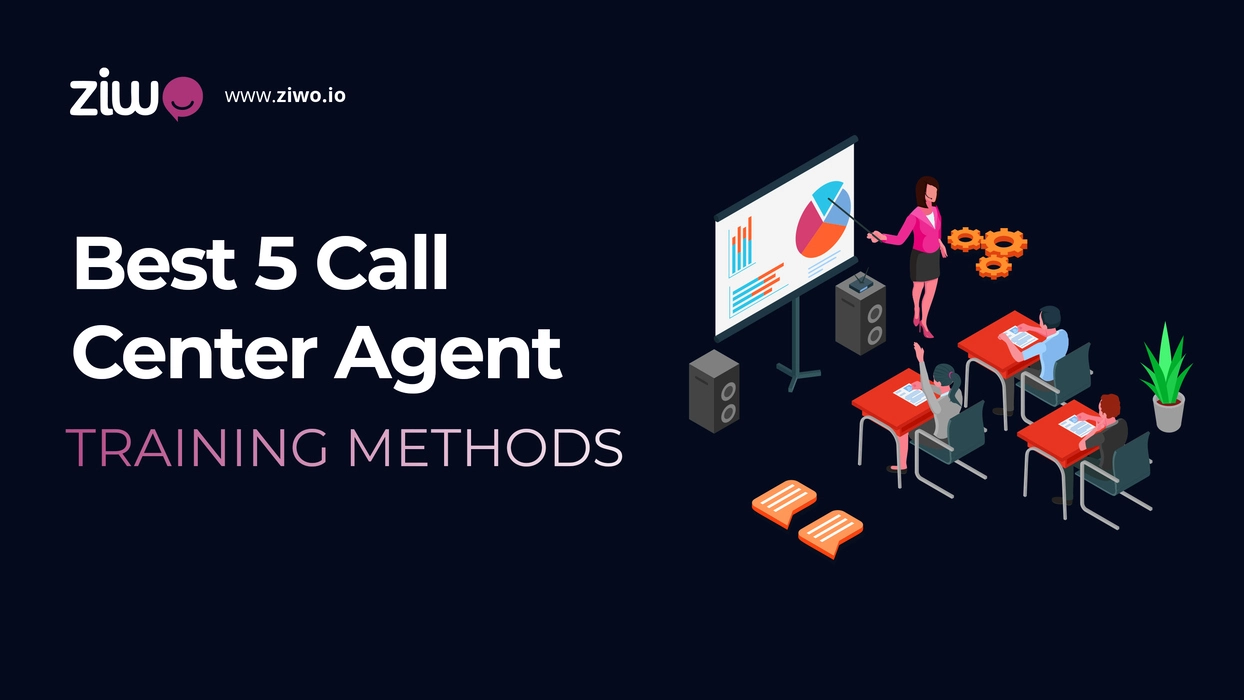
Call Center Agent Training Concept
The concept of call center agent training is a continuous process that aims to elevate your employees to a professional level. This level should represent your brand image. Every training process should cover certain items, which might include:
- Soft skills (communication, how to respond to customers, and interact with issues to solve, emotional intelligence, etc.)
- Increasing Awareness about the offered products or the services (Using methods, payment methods, settings, components, delivery methods, selling points, etc.)
- Tools and internal software solutions (Call center software, CRMs, ticketing and helpdesk systems, etc.)
- Local regulations related to data protection, personal customer information, and the company’s details. (Consumer protection laws, personal data protection, electronic transactions, etc.)
You should conduct call center agent training when a new hire is on board, even if they have prior experience working in a call center. The agent needs to know more about the elements of the work environment However, the training concept should be a key element in your facility, making it adaptable to each stage in the employee life cycle.
Every niche always needs development and the emergence of new values. So, you should set up training for your employees to help them:
- Acquire new skills.
- Use advanced apps and digital solutions.
- Explore new concepts.
- Discover new customers’ needs.
Also, there are standards related to organizing workshops for call center agents. Data is the key element in all training stages:
- Before training: surveys, insights, and analytics that prove the need for learning and gaining updated knowledge.
- During training: preparing questions and practical tests will clarify whether the employees have understood the knowledge or not.
- After training: measuring call center performance results after organizing the training. This enables you to check if the performance metrics are compliant with the target values or not. This will help call center managers, supervisors, and team leaders know if employees have benefited from training or not.
After the call center agent training ends, it’s expected that the new hire gets super! He can easily manage critical situations, solve issues, and deliver comprehensive customer service.
Call Center Agent Training Importance
Every training program is a concentrated dose of confidence that a call center agent needs throughout their career at the company.
When the candidate becomes a newly hired employee, the agent requires onboarding and qualification. This occurs to guide him to the most critical business elements, tools, business model, and customer persona.
With every update to the product or a new release to the marketplace, employees need related training. They should be fully aware of the facts behind stopping a specific service and replacing it with another.
In this section, we discuss the importance of a call center agent and its impact on both customers and employees.
1- Better Customer Experience
Call center agent training has a direct impact on the customer experience within your organization. The training connects to the significant elements that matter to the customer. For example:
- Answering customers’ inquiries.
- Calls, conversations, and virtual meeting management.
- Covering the call logs، transactions, and interests.
- Showing empathy and understanding of customers’ issues.
- Meeting customers’ expectations in every interaction.
2- Developing Agents’ Skills
An excellent call center agent training achieves a balance between different skills. Soft skills take precedence, along with the ability to utilize business software to manage operations. The agent should be aware of the plans and that your business has started implementing. This helps him keep the customer's high retention levels by mentioning your company’s plans on every suitable occasion.
3- Improving Service Level and Keeping Up With the New Trends
To develop call center agents, consider the key performance indicators (KPIs), with first call resolution (FCR) at the top of the list. After every training, the KPI is evaluated. If it has increased to 90% from 80%, the training has a positive impact.
Supporting employees with data and contemporary scientific insights helps them resolve customer issues. This enables agents to resolve the issue from the initial contact and achieve customer satisfaction.
4- Employee Turnover Reduction
When an employee decides to leave, it’s not only about hiring a new employee. It also refers to the fact that new casts appear, varying from three to four times the employee’s salary. So, the employee’s churn not only affects the customer’s experience, but also reduces the revenue.
If you value call center agent skills training, it’s challenging for agents to leave your company. Numerous surveys and studies have proven that the effectiveness of training in employee retention is evident.
5- Increasing Employee Productivity and Efficiency
Productivity and efficiency often emerge in challenging situations. However, the practical application is more important than the training. The training aims to elevate the customers’ skills to achieve the company’s goals. Regardless of the surrounding stresses that agents may struggle with, the customer receives the best service.
Providing suitable training reveals that your company invested in the employees’ experience and appreciates them as human resources.
6- Higher Profit Rates
The profit is the result of investment in employees and customer experience. Call center agent training is important. It helps increase profits by focusing on both the customer and the agent.
How to Prepare a Call Center Agent Training Program
Designing a training program for employees in the call center requires five primary stages:
1- Gather Data From the Team to Be Instructed
Before organizing any training program, you should accurately understand the team. This enables you to determine its strengths and weaknesses. These qualities help you identify which ones have the most significant impact on achieving business goals.
Qualities go under categorization. Therefore, priorities with the highest effectiveness take a more significant share of time and resources. This happens when the team has already spent a considerable amount of time in the company, but what if it’s a newly hired team?
The call center’s new batch or team has common qualities, especially if they have the same tasks. In every final job interview, the recruiter watches the candidate's social skills and attitude. They take notes on these observations. Thus, the call center supervisor or team leader benefits from the notes and takes them into account. So, they become a point of reference that the instructor will use when organizing the training sessions.
2- Determine the Training Objective
When you know your team's qualifications and characteristics, you can easily connect the dots. Now, you can discover the drawbacks that prevent the company from achieving its goals. What’s the objective of the training? In other words, why are you conducting it? For example, to increase customer satisfaction rates. The question is: “What common characteristics in the agents prevent rates from increasing?”
Any training must impact employees, customers, and the business as a whole. A successful goal is the one that maintains this line.
3- Design the Training Materials and Update Them
Training materials are as necessary as the training objective itself. Knowing how the staff behaves and the best ways to teach define the format of subjects. Are they motion graphic/video materials or static visuals? Will there be a speaker or just a person who uses a slideshow to share materials? Will the materials turn into a PDF so the agent can replace any features? Will the theoretical aspect be included in the training so that you can instruct more easily?
4- Choose Call Center Software
The call center software solution is considered one of the most crucial tools for call center agent training. Your call center can not achieve excellent objectives without a well-performing software. For example, ZIWO is a cloud call center that includes key features that help employees to train and learn, like:
- Listening to recorded calls.
- Real-time call monitoring
- Call Whispering
These are essential features that you can find in every solution. If it exists, you can efficiently conduct call center agent training.
5- Find the Most Suitable Method for Training
There are numerous training methods for employees in the business realm. You can implement one or all of them in your enterprise. It depends on what is more beneficial and suitable from your perspective. On the other hand, all the methods we mention have proven their efficiency.
After hiring a call center agent, they need a period to get accustomed to the organization’s culture and most commonly used expressions. Even if the agent receives a script, he should commit to it. Also, the training might include awareness of a new service or product. Also, the items discussed might be new updates that the agents should explain to customers.
Best 5 Call Center Agent Training Methods
To recognize the coaching techniques for call center agents, especially new hires, follow the steps below. We recommend applying all of them. You can see each method as a stage. The methods let the agent take part in the operations step by step.
1- Listening To Recorded Calls
If you're using contact center software, you'll have a call recording feature. This feature helps you meet quality objectives and allows trainees to gain experience from real-life calls. The new hire listens to the excellent call to simulate it from start to end, and the low-quality calls to identify their weak points and how the agent should have handled the situation.
2- Job Shadowing
By observing how the experienced agent applies phone etiquette, the new hire can identify and take notes on the most effective expressions, tone of voice, and verbal communication characteristics. So, he gradually inherits the knowledge and experience from the old agent and starts to put his personality into it.
3- Call Mocking
As a business owner or call center supervisor, you are familiar with the various situations that your team encounters. By observing everyday situations, ask the experienced call center agent to develop mock calls with the new hires to assess how they’ll act after a short shadowing period. It’s a role-play training session, where some agents act as themselves and others act as customers in specific situations. Then, they switch roles in the following situation.
4- Supporting Agents During Calls
When the new agent starts making and receiving calls, he will still need support. Team leaders and supervisors may participate in the call without the customer being aware.
Call center solutions often feature a call whispering function, which enables agents to receive instructions while on a call. So, regardless of the obstacles the customer puts in front of the agent, they’ll be resolved.
5- 1-1 Learning Session
In a particular stage, the agent won’t need any support. He acquired the experience and support through a comprehensive call center agent training program. However, you can still monitor real-time calls, so you know how he has adapted to customer etiquette.
After listening and taking notes, you can play the recorded calls to help him identify his slips and learn how to avoid them.
In a later stage, the agent won’t need any support, as he has acquired enough experience. However, you can still monitor his performance instantly while he’s on the call. Using the call monitoring feature, you can track the efficiency of the agent’s performance on live calls.
5 Aspects You Should Consider on Coaching Call Center Agents
Every training has its specific curriculum, tailored to the niche, organizational culture, and other key elements that define the brand identity. Every training should include common aspects to help the agent meet customer expectations.
1- Call Items Quality
Every training session should include the expressions and vocabulary used in the calls. This includes jargon and the suitable tone for every situation. A call center agent is responsible for managing calls efficiently. So, he interacts with the customer’s request to help him achieve the goal as soon as possible.
Therefore, every call becomes a turning point for success, ultimately creating a good reputation for the company. As the content quality in the calls increases, the FCR increases and lowers the handling time. Additionally, training agents to manage repeated complaints successfully, leveraging every call.
2- Agent’s Product Knowledge Level
If it is clear to the customer that the agent lacks sufficient knowledge, this embarrasses the employee and risks damaging the company’s reputation. A lack of knowledge is evident in the agent's nervous tone and failure to provide direct answers.
If you reviewed the recorded calls, you can determine the knowledge gap the agent has. This can be quickly addressed by organizing a training session that fills this gap.
3- Customer Retention Behaviors
It’s not only the sales agent’s responsibility to drive customers to repeat the purchase process. Every employee who deals with a customer through a call center represents your business. So, the way he interacts with them lets them continue the relationship or leave it.
When an employee helps a customer use a product optimally, achieving satisfaction quickly encourages them to repeat the experience. The training should include all the indirect methods that help maintain the brand's loyalty.
4- Soft Skills
All the previous aspects we discussed and found in call center agent training become useless without soft skills. Communication training programs for employees in call centers are vital. Additionally, other essential skills include emotional intelligence, negotiation, persuasion, presentation, empathy, problem-solving, and critical thinking.
These skills create a competitive advantage for your company that others don’t have. Many products and services might resemble each other. Eventually, customers may choose to purchase from certain brands over others because they can sense the friendliness of the employees.
5- Local Regulations Compliance
You should consider compliance with local regulations a significant part of your company's contact center. Customer data protection and confidential contact information are maintained for both customers and agents. No kind of abuse might happen with the help of call masking, which is available in most call center software.
The local regulations are similar to a medium-sized constitution that manages relationships between agents & customers and agents & businesses. The training focuses on items that define the limits between every party to maintain seamless communication.
3 Key Assets that Qualify Call Center Agents
Training tools may differ from one call center to another, depending on the communication platform used and the organizational culture. However, the most essential elements that build any training are as follows:
1- Call Center Agent Knowledge Base
You might call it a library, a database, or any other name. The primary objective of such a knowledge center is to provide call center agents with comprehensive information. The center identifies and organizes knowledge by sections, questions, or products. The knowledge base delivers information for every employee, relying upon their experience:
- New hires
- Medium experience agents
- Experienced employees
You can also classify training knowledge resources based on updates, available offers, and newly offered products. When the classification and indexing of knowledge become more accurate, it saves a lot of time for future training. Modifications become as limited as possible.
Also, you can categorize the knowledge based on the format:
- Expressions and definitions that a contact center agent should recognize, in terms of texts, infographics, or other visuals.
- How to use the system and tool guides in the company, a digital manual that includes videos explaining every function.
- Steps to set up, reset, install, or manage a customer account, illustrated with screenshots.
2- Learning Management Systems and Contact Center Tools
Online training may require additional software solutions, such as hosting the sessions, where a virtual classroom brings together the instructor and trainees.
Additionally, recorded videos, audio files, and resources may be shared through a learning management system (LMS). The LMS also enables trainees to engage with questions and quizzes to check their comprehension level.
Training never ends, even after completing the sessions and interacting with employees. The contact center agents should have access to a knowledge base that includes the frequently asked questions customers might ask . Additionally, there are battle cards that instantly support the agents in responding to customers’ inquiries.
3- Contact Center Tools
You should monitor the calls and verify if the attendees have applied the training items to achieve the objectives. Contact center solutions encompass call recording features and KPIs tracking. Moreover, you can assess agents' efficiency through customer satisfaction surveys, which include KPIs that are significant to your business.
Top Questions You Should Ask After Coaching a Call Center Agent
Once new team members demonstrate confidence after training, integrate them into the call center floor to begin their assigned duties. However, it’s preferred to make a quick examination to assess how the contact center agents digested the training materials before officially joining the team. These questions might appear as:
- In case of organizing training for newly hired contact center agents (first-time working as a call center agent)
- How do you greet the customer at the beginning of the conversation?
- After resolving the issue, what is the next step you should take?
- When the customer has an inquiry, what is the first thing you should do?
- What is the first thing you should do when starting a call or a chat?
- What are the signs that indicate you should transfer the customer to another agent or department rather than handling the issue yourself?
- What if you didn’t have the answer to the customer’s question, what would you say?
- What if the customer abandoned the call or the line accidentally disconnected?
- What would you do if the customer asked about a product that is out of stock?
- In case of organizing training for contact center agents about issue handling
- When an angry or frustrated customer calls, asking to speak with the manager directly, what is the best course of action?
- If a customer misbehaved or became aggressive during a phone call, how would you handle the situation?
- If the customer’s issue is escalated to a supervisor or a specialist, what steps should you take to notify them?
- When the customer shows any form of disrespect during a call, what official actions should you take?
- If a customer is not satisfied with a product they received, what steps should you take to resolve the issue?
- A customer reaches out to acknowledge that a shipment hasn’t arrived yet. How do you deal with this?
- In case of organizing training for contact center agents about the current customer account management
- How do you access the key data of customers’ previous activities, past purchases, account information, and other relevant details?
- A customer contacts the center requesting assistance with accessing their account. How would you help him?
- A customer requests a purchase for himself via a phone call. How do you process his purchase request?
- Based on which standards do you presume that the customers are suitable for upselling or cross-selling offers?
- If a customer contacts you expressing his (Add a painpoint that your business can solve or manage), what will you do?
- If a customer is accidentally charged, what actions would you take to resolve the issue?
Conclusion
Coaching contact center agents' principles shouldn’t be related to a specific period or duration of the agent’s life cycle. Call center agent training is a continuous process that requires ongoing nurturing. This enables the agent to comprehend the business elements that satisfy customers and foster their loyalty.
Over time, numerous tools and supportive systems have emerged in the market to contribute to delivering practical training tools. Contact center software is considered one of those. Before coaching your employees, select a suitable training method that aligns with the call center software used in your business.





